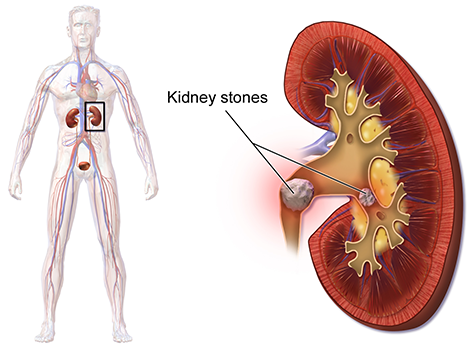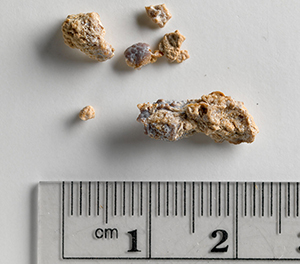 The Division of Nephrology in the University of Arizona Department of Medicine and Division of Urology in the UA Department of Surgery, at the UA College of Medicine – Tucson, and the Department of Nutritional Sciences, at the UA College of Agriculture and Life Sciences, have teamed up to launch a new Kidney Stone Clinic that will begin seeing patients in early July.
The Division of Nephrology in the University of Arizona Department of Medicine and Division of Urology in the UA Department of Surgery, at the UA College of Medicine – Tucson, and the Department of Nutritional Sciences, at the UA College of Agriculture and Life Sciences, have teamed up to launch a new Kidney Stone Clinic that will begin seeing patients in early July.
“This would be the first clinic of its kind in Arizona and Banner – University Medicine Tucson and South can lead the way” in offering comprehensive clinical care to kidney stone patients, said  Sireesha Koppula, MD, MPH, a UA assistant professor and one of two nephrologists who will practice at the clinic. “This clinic also would enable us to enroll patients into a national stone registry and be part of clinical trials and create future opportunities for patient-centered research here.”
Sireesha Koppula, MD, MPH, a UA assistant professor and one of two nephrologists who will practice at the clinic. “This clinic also would enable us to enroll patients into a national stone registry and be part of clinical trials and create future opportunities for patient-centered research here.”
Kidney stone formation (Photo: Blausen Medical/Wikipedia)
The Kidney Stone Clinic will be located in the new Urology clinical space also opening in July on the third floor at Banner – University Medicine North, 3838 N. Campbell Ave., Building 2—the new 208,000-square-foot outpatient care facility that opened in December adjacent to the UA Cancer Center Peter and Paula Fasseas Cancer Clinic at the corner of Campbell and Allen Road.
 Kidney stones (Photo: erick gould/flickr)
Kidney stones (Photo: erick gould/flickr)
 “Our goal is to leverage the multi-disciplinary strengths within Banner Health and the University of Arizona to create a unique, cutting edge, patient centered program for the management of kidney stones,” said UA professor and nephrology chief Prabir Roy-Chaudhury, MD, PhD (on left at right).
“Our goal is to leverage the multi-disciplinary strengths within Banner Health and the University of Arizona to create a unique, cutting edge, patient centered program for the management of kidney stones,” said UA professor and nephrology chief Prabir Roy-Chaudhury, MD, PhD (on left at right).
Urology chief and UA professor Benjamin Lee, MD (above right), said much of the clinic’s focus would be to identify risk factors for repeat kidney stone sufferers and make adjustments to their diet and health regimen to help prevent stones from returning in the future.
“The collaboration would involve Urology, Nephrology and Nutritional counseling, conducting a complex metabolic analysis of patients, potential addition of medications to prevent stones from recurring, and/or counseling to advise patients on which foods are high in oxalate or uric acid, depending on stone composition,” Dr. Lee added.
Funding for the Kidney Stone Clinic comes from Banner Health’s Highest and Best Use Program, said Dr. Koppula, who is also medical director of inpatient dialysis at Banner – University Medical Center South as well as nephrology clinic operations and quality at Banner – University Medical Group Tucson, and associate chair for quality and safety (outpatient) in the Department of Medicine. The clinical team, she said, will include a nurse navigator, dietitian, two nephrologists and a urologist.
 The other physicians at the Kidney Stone Clinic include UA nephrologist and assistant professor Sangeetha Murugapandian, MBBS, and David T. Tzou, MD, a urologist and new UA assistant professor who joins the UA College of Medicine – Tucson faculty from the University of California San Francisco, where he completed an Endourology Fellowship and served as an adjunct assistant professor in the Department of Urology. Dr. Tzou did his undergraduate studies at UC Berkeley and earned his medical degree from the UA College of Medicine – Tucson, where he completed his internship in surgery and residency in urology—serving as urology chief resident in 2012-13.
The other physicians at the Kidney Stone Clinic include UA nephrologist and assistant professor Sangeetha Murugapandian, MBBS, and David T. Tzou, MD, a urologist and new UA assistant professor who joins the UA College of Medicine – Tucson faculty from the University of California San Francisco, where he completed an Endourology Fellowship and served as an adjunct assistant professor in the Department of Urology. Dr. Tzou did his undergraduate studies at UC Berkeley and earned his medical degree from the UA College of Medicine – Tucson, where he completed his internship in surgery and residency in urology—serving as urology chief resident in 2012-13.
“Dr. Tzou has a particular interest in specialized surgical treatment of staghorn calculi, including ultrasound-guided percutaneous access as the first step in treatment,” Dr. Lee said. Staghorn calculi refer to branched stones that fill all or part of the renal pelvis and branch into several or all of the calyces, or cuplike cavities in that area of the pelvis.
Kidney stones—small, hard deposits that form in the kidneys and often painful when passed—are thought to be a product of a diet high in salt and processed foods, but they are also associated with certain medical factors that leave some patients at a higher risk for repeat stone formation.
Dr. Koppula noted that most kidney stone patients simply are treated and released in hospital emergency rooms or outpatient clinics with little provided on how to avoid repeat formation of stones. This leads to associated complications that in turn lead to progressive decline of renal function
“Sometimes, they can have 20, 30 stones,” she said. “Here, they’ll get care provided nowhere else in the state. People will be able to get advice on how to prevent them. They come in. They get treated. We provide them with educational materials and classes to learn what lifestyle changes they’ll need to make to avoid kidney stones in the future.”
The Kidney Stone Clinic will start at a half-day a week. About 12 patients will be able to be seen in that time. Dr. Koppula hopes the clinic will expand quickly due to the underserved nature of kidney stone patients who often are at high risk of repeat stone formation.
In other news, Dr. Koppula noted that an expansion at the Banner – UMC South dialysis clinic is under way also that will add three beds to the service for a total of five beds when complete. The Banner – UMC Tucson dialysis clinic has eight beds.

